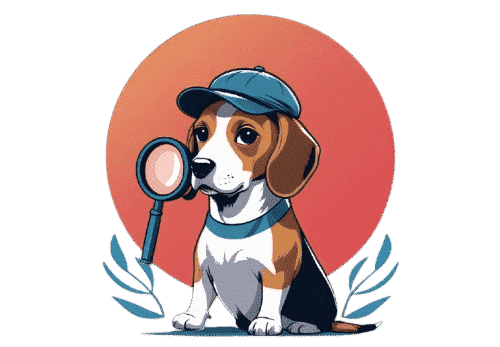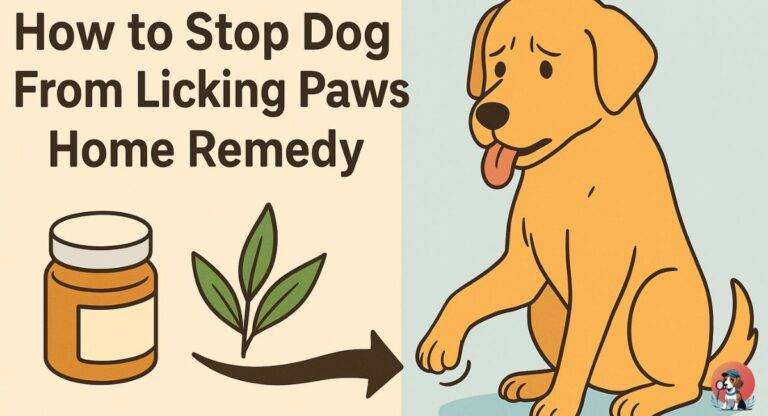Dog Licking Feet is a common behavior that many pet owners notice daily. When your dog is licking feet, it may show affection, curiosity, or a way to soothe anxiety. Observing a dog licking feet carefully helps identify if it’s a normal habit or a sign of allergies, infections, or stress. Dog licking feet often increases after long walks or salty meals, while persistent dog licking feet could indicate health issues. By understanding dog licking feet and applying practical solutions, you ensure your dog stays healthy and happy, reducing unwanted behaviors and improving your bond with your dog licking feet.
Dog Licking Feet can be a harmless expression of love, but dog licking feet may also indicate underlying medical or emotional concerns. If your dog is dog licking feet excessively, it might be related to diabetes, skin irritations, or anxiety. Monitoring dog licking feet allows you to distinguish between natural behavior and potential health problems. Using safe remedies or training methods can reduce unwanted dog licking feet habits. Understanding triggers behind dog licking feet not only maintains hygiene but also ensures your pet’s well-being. Observing a dog licking feet consistently will help prevent complications and foster a happy, stress-free life.
Dog Licking Feet is a behavior that often surprises new pet owners. While occasional dog licking feet is normal, frequent dog licking feet can signal allergies, dry skin, or boredom. Dogs may engage in dog licking feet as a comforting ritual or to explore scents, while persistent dog licking feet could affect your home hygiene. Addressing dog licking feet with home remedies, behavioral tips, and proper care ensures your dog remains comfortable. By recognizing the reasons for dog licking feet and acting early, you can prevent infections, maintain paw health, and enjoy a stronger connection with your loyal dog licking feet companion.
Dog Licking Feet raises curiosity about why dogs develop this habit. Sometimes, dog licking feet shows affection, but repeated dog licking feet may point to stress, anxiety, or health conditions. Observing when your dog is dog licking feet helps you identify triggers and intervene appropriately. Excessive dog licking feet can lead to skin irritation, infections, or discomfort, making preventive care important. Using home remedies and positive reinforcement techniques can control dog licking feet effectively. Educating yourself on dog licking feet allows you to protect your dog’s health, improve hygiene, and foster a loving environment where dog licking feet becomes a safe, natural expression.
1. Why Do Dogs Lick Feet?
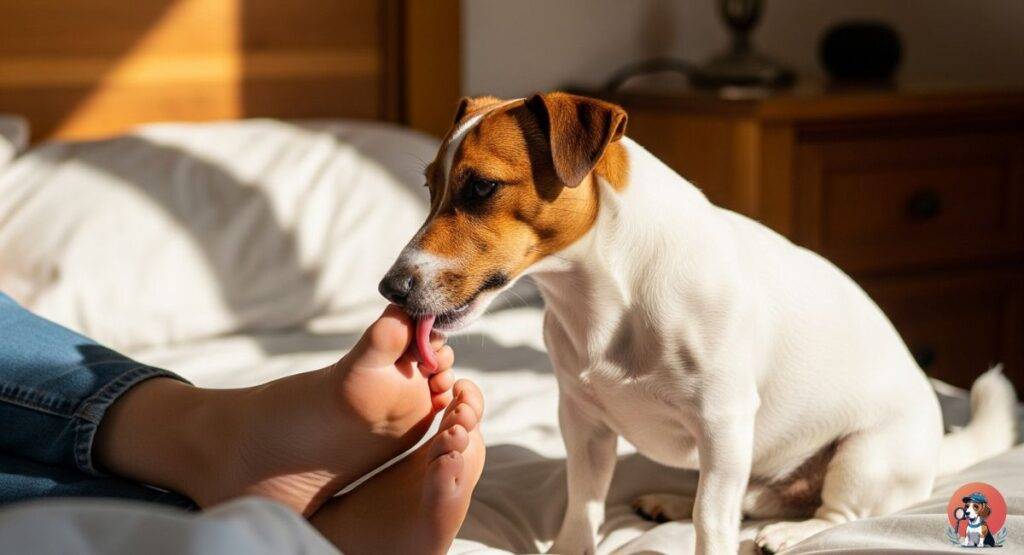
Dog licking feet is a common behavior that reflects more than just curiosity. Dogs often use licking to express affection, bond with their owners, or release stress. While occasional dog licking feet is normal, frequent or obsessive licking may indicate anxiety, boredom, allergies, or minor health issues. Observing your dog’s behavior helps you identify whether it’s a harmless habit or something that needs attention. Understanding why your dog engages in dog licking feet ensures better care, prevents skin irritation, and strengthens your bond.
Excessive dog licking feet can also be linked to underlying health conditions like diabetes, dry skin, or minor infections. Puppies may copy this behavior from their mothers, while adult dogs may continue due to habit or routine. Recognizing the triggers of dog licking feet allows you to intervene early, use home remedies, and maintain paw hygiene. By learning the reasons behind dog licking feet, you can keep your dog happy, healthy, and emotionally balanced.
Key reasons dogs lick feet:
-
Dogs enjoy the salty taste of human skin.
-
Licking is a natural instinct for grooming and bonding.
-
Helps dogs relieve stress and anxiety.
-
Shows affection and emotional attachment.
-
It can be a way to attract the attention of owners.
-
Provides sensory exploration of textures and smells.
-
Puppies mimic licking behavior from their mothers.
-
It can be a habit formed due to boredom or routine.
-
Signals affection and is reinforced by positive experiences.
-
May indicate minor discomfort or irritation that needs care.
2. Is Dog Licking Feet Normal or a Problem?
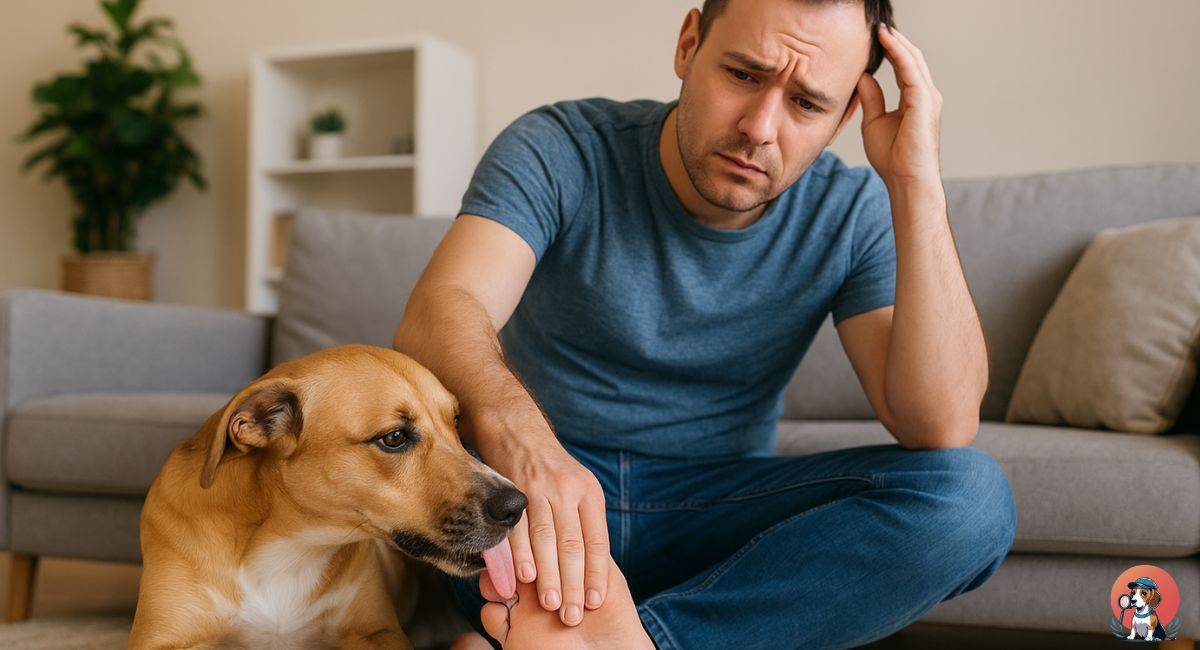 Dog licking feet can be cute and harmless when it happens occasionally, often reflecting affection, curiosity, or comfort-seeking behavior. Dogs may lick your feet after walks or while you relax to bond with you. However, if dog licking feet becomes frequent, obsessive, or seems linked to anxiety, it may signal a problem. Observing the frequency, context, and accompanying symptoms helps distinguish normal behavior from concerning habits. Understanding these patterns ensures you can manage dog licking feet without stress and maintain both your dog’s health and your comfort.
Dog licking feet can be cute and harmless when it happens occasionally, often reflecting affection, curiosity, or comfort-seeking behavior. Dogs may lick your feet after walks or while you relax to bond with you. However, if dog licking feet becomes frequent, obsessive, or seems linked to anxiety, it may signal a problem. Observing the frequency, context, and accompanying symptoms helps distinguish normal behavior from concerning habits. Understanding these patterns ensures you can manage dog licking feet without stress and maintain both your dog’s health and your comfort.
Excessive dog licking feet can also create hygiene and health concerns. Constant moisture may irritate your skin, cause small cuts, or allow bacteria and harmful substances to transfer to your dog. Puppies and adult dogs may develop compulsive dog licking feet habits if left unchecked. Establishing boundaries and using gentle redirection allows you to control the behavior effectively. Recognizing when dog licking feet is becoming problematic protects both you and your dog while maintaining a happy, safe environment.
Key points to consider:
-
Normal if licking happens occasionally.
-
Problematic when it becomes obsessive.
-
Watch for redness or swelling on your skin.
-
Check your dog’s mouth for sores.
-
Consider whether your dog is anxious.
-
Excessive licking may indicate medical issues.
-
Dogs may develop compulsive licking habits.
-
Hygiene risks exist for both the dog and the owner.
-
Observe whether licking interrupts daily life.
-
Balance affection with training limits.
3. How to Stop a Dog from Licking Paws: Home Remedy
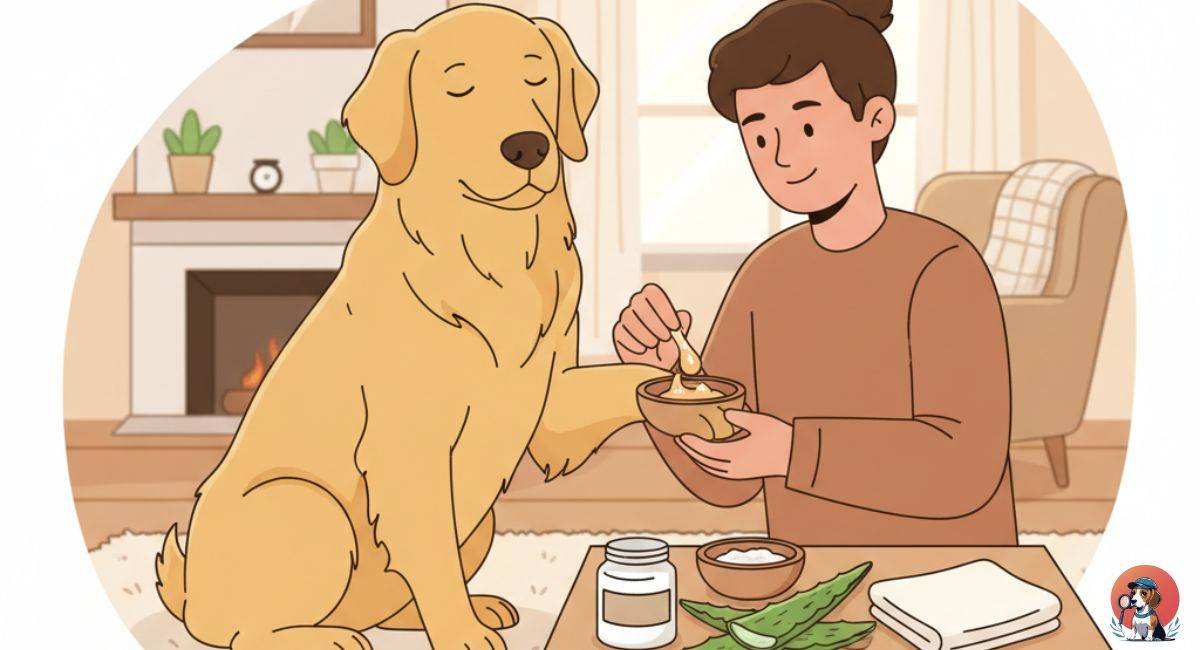 Excessive dog licking paws often occurs alongside dog licking feet and may be caused by irritation, allergies, or dry skin. Simple home remedies can provide relief while keeping your dog comfortable. Oatmeal baths, coconut oil, and chamomile tea soaks help soothe itchy paws naturally. Observing when and why your dog engages in dog licking paws allows you to intervene early, reducing stress and preventing compulsive behavior. How to stop dog from licking paws home remedy, using these methods ensures a healthier, happier dog and minimizes paw irritation.
Excessive dog licking paws often occurs alongside dog licking feet and may be caused by irritation, allergies, or dry skin. Simple home remedies can provide relief while keeping your dog comfortable. Oatmeal baths, coconut oil, and chamomile tea soaks help soothe itchy paws naturally. Observing when and why your dog engages in dog licking paws allows you to intervene early, reducing stress and preventing compulsive behavior. How to stop dog from licking paws home remedy, using these methods ensures a healthier, happier dog and minimizes paw irritation.
Frequent dog licking paws may also indicate minor infections or discomfort. Natural treatments like diluted apple cider vinegar rinses, aloe vera gel, and paw balms help moisturize and protect the skin. Keeping paws clean, trimming hair between pads, and providing distractions such as chew toys or extra exercise can prevent repeated dog licking paws. Monitoring behavior and using gentle interventions ensures your dog remains comfortable while maintaining paw hygiene and avoiding complications.
Effective home remedies:
-
Oatmeal baths for soothing skin.
-
Coconut oil to moisturize and heal.
-
Chamomile tea paw soaks for relaxation.
-
Diluted apple cider vinegar as a rinse.
-
Aloe vera gel for cooling irritated paws.
-
Keep paws clean after every walk.
-
Trim hair between paw pads to prevent irritation.
-
Use natural paw balms for protection.
-
Distract with chew toys and puzzles.
-
Provide extra exercise to reduce stress licking.
4. Dogs Licking Feet Diabetes Connection
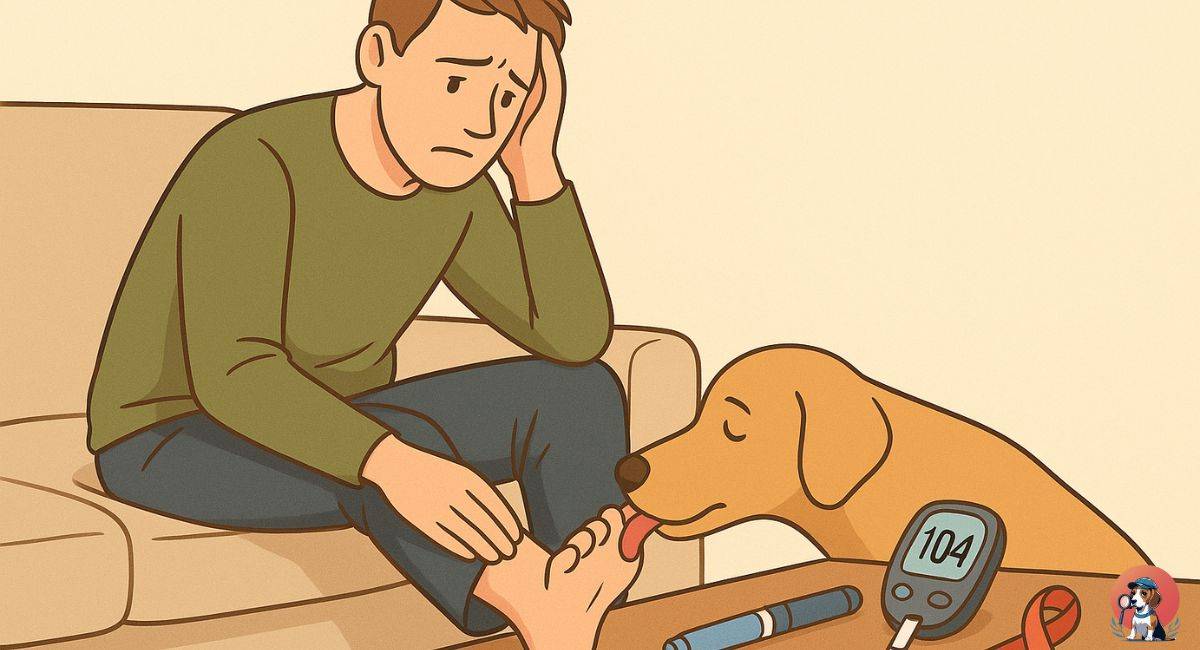 Sometimes, dog licking feet may be linked to health conditions such as diabetes. Dogs with Dogs Licking Feet Diabetes can develop neuropathy, causing tingling or discomfort in their limbs, which triggers excessive licking. Observing patterns of dog licking feet alongside other signs helps detect potential medical concerns early. Diabetes in dogs may present with symptoms like frequent urination, increased thirst, lethargy, or weight loss despite eating well, making it important to act promptly.
Sometimes, dog licking feet may be linked to health conditions such as diabetes. Dogs with Dogs Licking Feet Diabetes can develop neuropathy, causing tingling or discomfort in their limbs, which triggers excessive licking. Observing patterns of dog licking feet alongside other signs helps detect potential medical concerns early. Diabetes in dogs may present with symptoms like frequent urination, increased thirst, lethargy, or weight loss despite eating well, making it important to act promptly.
Excessive dog licking feet alone doesn’t confirm diabetes, but combined with other symptoms, it signals a need for veterinary attention. Managing underlying health issues and monitoring dog licking feet habits helps prevent further discomfort or complications. With early detection and proper care, dogs experiencing Dogs Licking Feet Diabetes can lead healthier, more comfortable lives while owners take preventive steps to ensure well-being.
Things to watch for in diabetic dogs:
-
Excessive thirst and urination.
-
Noticeable weight loss.
-
Constant fatigue or weakness.
-
Sweet-smelling breath.
-
Delayed healing of wounds.
-
Sudden vision problems.
-
Nerve sensitivity in paws.
-
Frequent licking of feet or paws.
-
Increased appetite without weight gain.
-
Confirm diagnosis with blood tests.
5. Is It Bad for Your Dog to Lick Your Feet?
Many owners enjoy the affection shown when dog licking feet, but it can pose risks. Human skin carries bacteria, sweat, dirt, and sometimes lotions or deodorants that are harmful to dogs. Excessive dog licking feet increases the risk of ingesting unsafe substances. Monitoring and redirecting behavior ensures that dog licking feet remains safe, hygienic, and enjoyable for both owner and pet.
Repeated dog licking feet may also create dependency or anxiety in dogs, leading to compulsive behavior. Persistent licking can cause fungal infections or skin irritation for owners. Permitting occasional dog licking feet while setting boundaries allows affection without health risks. Is it bad for your dog to lick your feet? Understanding the balance between letting dogs show love and protecting health ensures a happy, safe relationship where dog licking feet remains a positive interaction.
Risks of letting dogs lick feet:
-
Possible ingestion of toxic lotions or creams.
-
Bacteria on human feet may affect your dog.
-
Sweat and dirt may upset digestion.
-
May transmit fungal infections.
-
Excessive licking can cause mouth sores.
-
Creates a hard-to-break habit.
-
Limits hygiene for both the pet and the owner.
-
Risk of skin irritation for you.
-
Risk of dental issues for your dog.
-
Safer to limit the behavior.
6. Dog Licking Paws vs Dog Licking My Feet
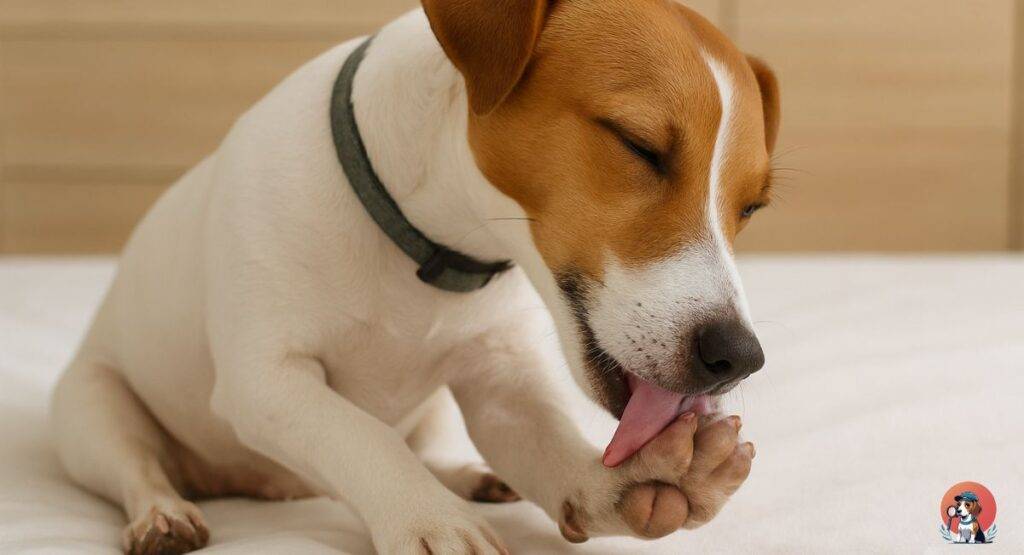 Dog licking paws differs from dog licking my feet, and understanding this difference helps address the root cause effectively. Most often, dog licking paws occurs due to allergies, irritation, or infections, whereas licking feet is usually behavioral or emotional. Observing when and why your dog engages in dog licking paws allows owners to respond appropriately, preventing further complications. Recognizing patterns in dog licking paws also ensures timely care and keeps your dog comfortable while addressing potential health concerns naturally.
Dog licking paws differs from dog licking my feet, and understanding this difference helps address the root cause effectively. Most often, dog licking paws occurs due to allergies, irritation, or infections, whereas licking feet is usually behavioral or emotional. Observing when and why your dog engages in dog licking paws allows owners to respond appropriately, preventing further complications. Recognizing patterns in dog licking paws also ensures timely care and keeps your dog comfortable while addressing potential health concerns naturally.Excessive dog licking paws often signals medical issues, unlike dog licking my feet, which tends to be attention-seeking or affectionate. Being aware of triggers for dog licking paws, such as discomfort or infections, allows for proper intervention and home remedies. Monitoring dog licking paws ensures hygiene is maintained, prevents compulsive behavior, and supports overall paw health. Early action on dog licking paws keeps your dog happy, reduces irritation, and strengthens the bond between you and your pet.
Differences between paw licking and foot licking:
-
Paw licking often signals allergies or irritation.
-
Foot licking is usually affectionate or social.
-
Paw licking can indicate infections or medical issues.
-
Foot licking may be an attention-seeking behavior.
-
Paw licking may require vet visits.
-
Foot licking often requires training or redirection.
-
Self-licking helps soothe discomfort.
-
Licking humans often indicates bonding.
-
Paw licking can become compulsive if ignored.
-
Foot licking usually reflects behavioral needs rather than medical problems.
7. Allergies and Irritants Causing Licking
Dog licking feet or dog licking paws is often triggered by allergies or environmental irritants. Pollen, dust, chemicals, or certain foods can irritate a dog’s skin, causing itching and discomfort that leads to licking. Seasonal allergies, particularly in spring, often increase dog licking paws or feet after outdoor exposure. Identifying patterns of dog licking paws allows owners to address causes early, preventing chronic irritation and infections.
Food allergies can also lead to persistent dog licking feet or paws throughout the year. Red, inflamed skin, ear infections, or constant licking may indicate dietary triggers. By understanding the allergens behind dog licking paws, owners can implement diet changes, home remedies, or environmental adjustments. Observing dog licking feet behavior ensures timely intervention and helps maintain your dog’s comfort and overall health.
Allergy triggers to look for:
- Grass and pollen exposure.
- Dust or household allergens.
- Chemical cleaners on floors.
- Flea bites or mite infestations.
- Food allergies cause skin irritation.
- Laundry detergents on bedding.
- Perfumes or body lotions.
- Mold in the home environment.
- Certain fabrics or carpets.
- Seasonal weather changes.
8. Stress and Anxiety Triggers
Excessive dog licking feet or dog licking paws may indicate stress or anxiety. Licking is a natural self-soothing behavior, much like nail-biting in humans. Dogs with separation anxiety, boredom, or lack of mental stimulation may lick excessively. Recognizing stress-related dog licking paws helps owners address emotional causes rather than just the behavior itself, ensuring a healthier, happier dog.
Providing adequate mental and physical stimulation reduces dog licking feet caused by stress. Walks, interactive toys, and playtime prevent compulsive dog licking paws. A calm and secure environment minimizes anxiety-driven licking while supporting emotional well-being. Monitoring stress-induced dog licking paws ensures proactive care and helps maintain a positive bond between dog and owner.
Stress triggers in dogs:
- Loud noises like fireworks.
- Being left alone for long hours.
- Changes in daily routine.
- Lack of exercise or playtime.
- Moving to a new environment.
- Overcrowded living spaces.
- Introducing a new pet.
- Strangers visiting the home.
- Health conditions causing stress.
- Boredom from a lack of activities.
9. Possible Infections Behind Licking
Persistent dog licking paws or dog licking feet may signal infections rather than behavioral issues. Yeast or bacterial infections create discomfort, prompting dogs to lick excessively. Ignoring these signs can worsen symptoms and prolong irritation. Monitoring dog licking paws helps detect infections early and ensures timely veterinary care.
Indicators like redness, swelling, foul odor, or discharge are signs of dog licking paws caused by infections. Preventive hygiene, such as regular paw cleaning and trimming, reduces infection risk. Understanding infection-driven dog licking my feet ensures your dog receives medical care promptly, preventing complications and maintaining overall paw health and comfort.
Signs of infection:
- Strong odor from paws.
- Redness or swelling.
- Cracked skin or sores.
- Persistent moisture.
- Hair loss around paws.
- Excessive paw chewing.
- Limping due to pain.
- Discharge or pus.
- Worsening after licking.
- Requires medical treatment.
10. Hygiene Tips to Reduce Licking
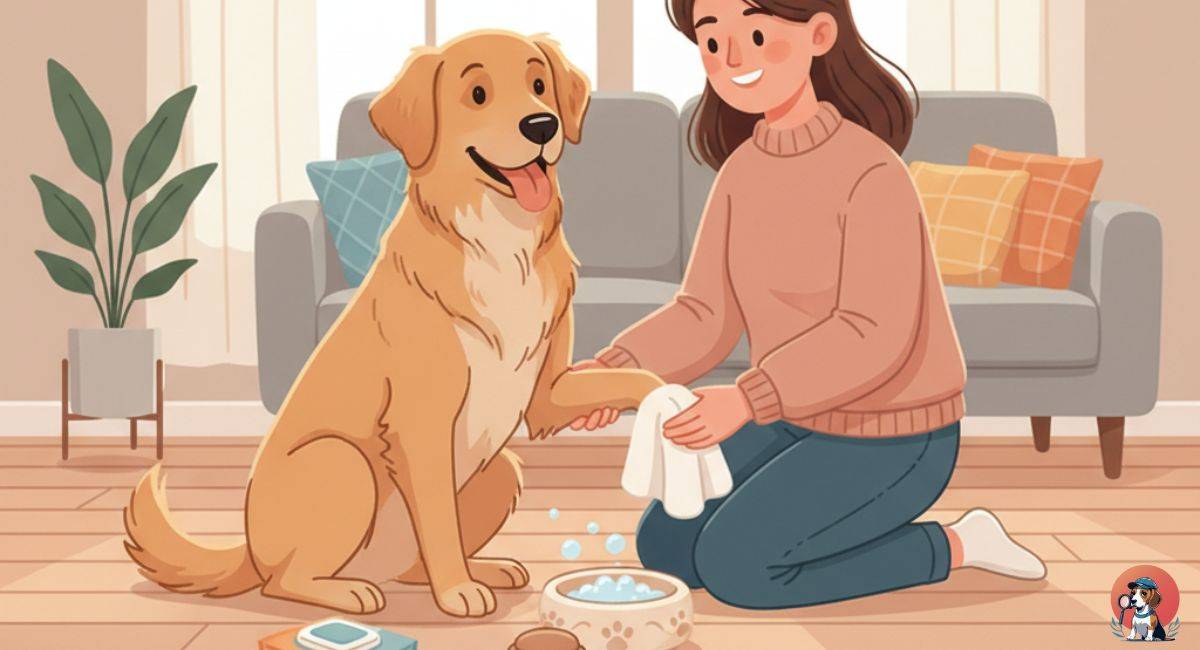 Proper hygiene can reduce dog licking paws and dog licking feet. Sweat, dirt, and irritants make licking more appealing, so cleaning both your dog’s paws and your feet regularly is essential. Simple grooming habits prevent compulsive dog licking paws and maintain a dog’s comfort and health.
Proper hygiene can reduce dog licking paws and dog licking feet. Sweat, dirt, and irritants make licking more appealing, so cleaning both your dog’s paws and your feet regularly is essential. Simple grooming habits prevent compulsive dog licking paws and maintain a dog’s comfort and health.
Avoiding scented lotions, harsh cleaners, or chemicals also limits dog licking feet. Trimming nails, drying paws after walks, and using dog-safe wipes maintain cleanliness and reduce irritation. Observing hygiene-related triggers behind dog licking paws helps owners naturally curb licking, keeping dogs healthy, happy, and comfortable.
Hygiene tips:
- Wash feet after long days outside.
- Keep your dog’s paws clean after walks.
- Trim dog nails regularly.
- Dry paws to prevent infections.
- Avoid scented lotions or creams.
- Bathe dogs with mild shampoo.
- Use dog-safe wipes for quick cleaning.
- Check paw pads for stuck debris.
- Keep bedding clean and fresh.
- Avoid harsh floor cleaners.
11. Training to Control Excessive Licking
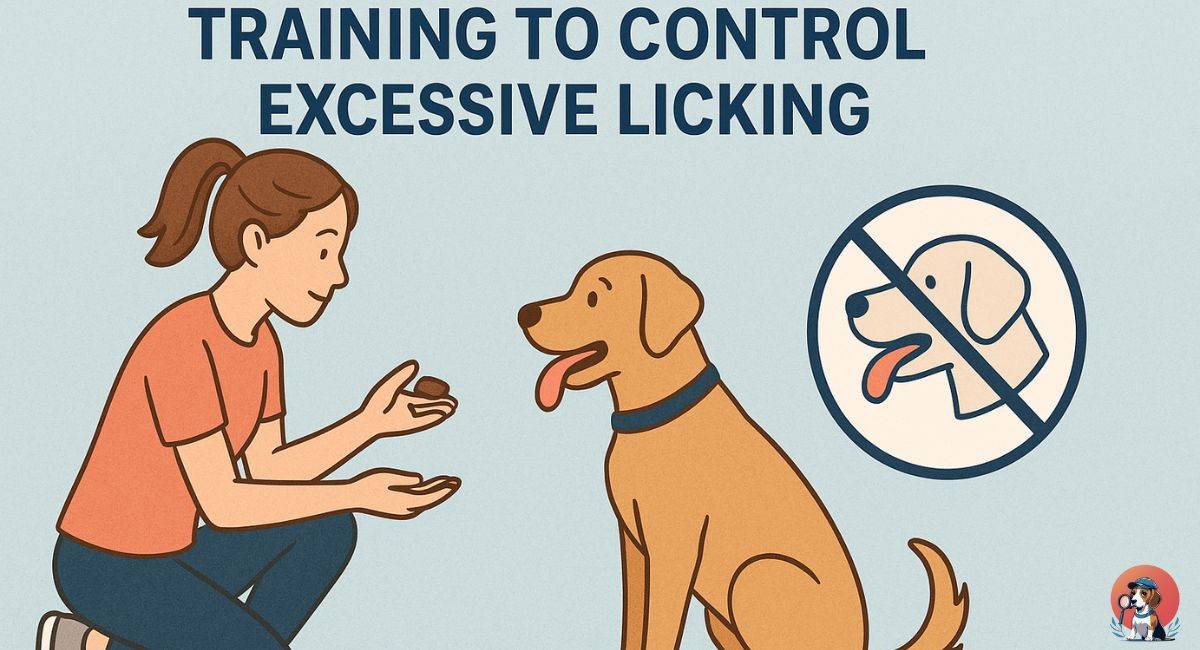 Controlling excessive dog licking paws or dog licking feet requires consistent training. Positive reinforcement works best, rewarding dogs when they stop licking and redirecting their attention to toys or activities. Training helps manage compulsive dog licking paws while maintaining trust and affection between dog and owner.
Controlling excessive dog licking paws or dog licking feet requires consistent training. Positive reinforcement works best, rewarding dogs when they stop licking and redirecting their attention to toys or activities. Training helps manage compulsive dog licking paws while maintaining trust and affection between dog and owner.
Consistency and patience are key in reducing dog licking feet. Short daily training sessions, clear commands, and gentle redirection prevent reinforcement of licking behaviors. Using puzzle toys, extra exercise, and mental stimulation reduces boredom-related dog licking paws, ensuring dogs understand boundaries while maintaining a strong, healthy bond.
Training methods:
- Use commands like “leave it.”
- Reward the dog when they stop licking.
- Offer chew toys as distractions.
- Ignore behavior to reduce attention-seeking.
- Redirect with walks or games.
- Practice consistency daily.
- Avoid yelling or punishment.
- Use puzzle feeders to reduce boredom.
- Seek professional help if severe.
- Build trust and patience.
12. When to See a Veterinarian
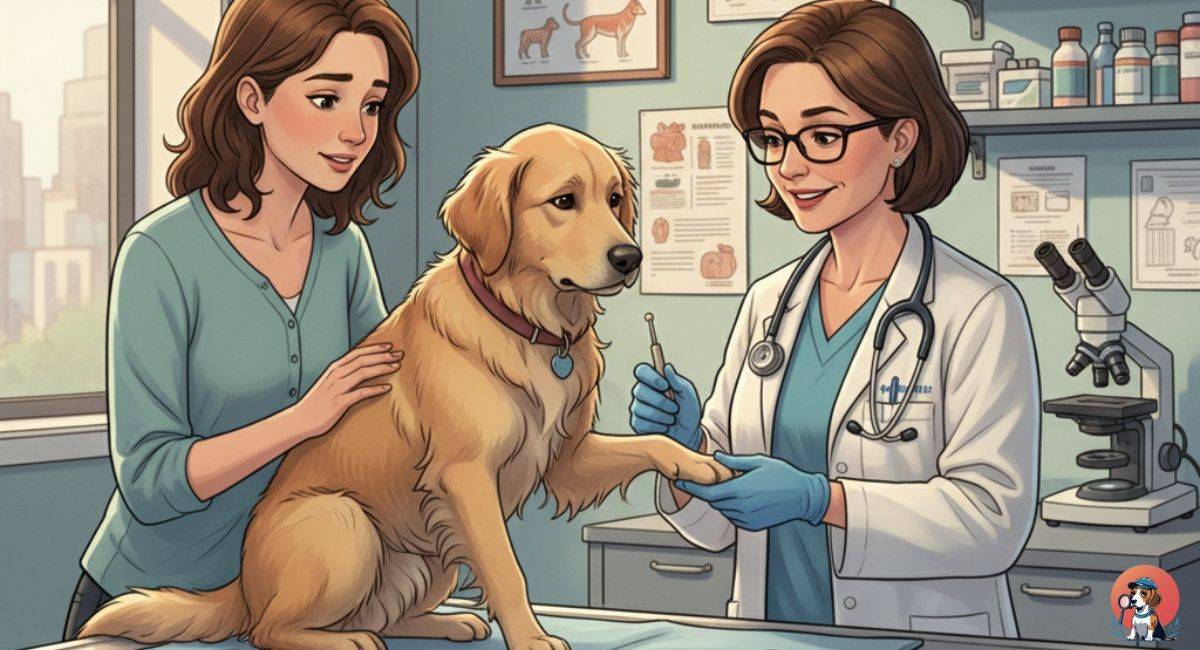 Not all dog licking feet or dog licking paws is harmless. Persistent licking with limping, sores, or other symptoms requires a veterinary visit. Early diagnosis ensures proper treatment and prevents complications, keeping dogs healthy and comfortable.
Not all dog licking feet or dog licking paws is harmless. Persistent licking with limping, sores, or other symptoms requires a veterinary visit. Early diagnosis ensures proper treatment and prevents complications, keeping dogs healthy and comfortable.
Vets can rule out infections, allergies, diabetes, or other health concerns causing dog licking paws or feet. Timely intervention reduces discomfort, prevents worsening conditions, and maintains overall well-being. Recognizing when dog licking feet signals a serious problem allows owners to act quickly, ensuring dogs stay happy, safe, and healthy.
When to seek vet care:
- Persistent licking with limping.
- Visible sores or wounds.
- Bad odor from paws.
- Swelling or inflammation.
- Unexplained weight loss.
- Lethargy plus licking.
- Constant thirst and urination.
- Signs of pain or whimpering.
- Blood or pus discharge.
- Any behavior that worsens suddenly.
FAQs
1. Why does my dog constantly lick my feet?
Dog licking feet every day usually means your pet finds comfort in the behavior or enjoys the salty taste of your skin. It can also be their way of greeting you or showing affection. If it becomes excessive, it may signal anxiety or a habit.
2. Could it be that when dogs lick your feet, they’re actually showing signs of stress?
Dog licking feet can be a stress-relief behavior, similar to how humans bite nails. If your dog licks your feet when nervous or during loud noises, it likely helps them calm down.
3. Is dog licking feet safe for me?
Dog licking feet is mostly safe, but it can spread bacteria. Constant licking may irritate your skin, while your dog may ingest harmful substances. It’s a good idea to keep licking to a minimum and make sure to wash your feet regularly.
4. Is it a sign of love when my dog licks my feet?
Dog licking feet often indicates affection. It is a bonding gesture that shows your dog feels close to you. Dogs use licking as their version of hugs and kisses.
5. Can dog licking feet relate to allergies?
Dog licking feet may be linked to allergies in either your dog or substances on your skin. Grass, pollen, or lotions can trigger licking responses.
6. What dog licking feet if my diabetic dog licks more often?
Dog licking feet in diabetic dogs may indicate nerve sensitivity or skin issues caused by the condition. Always watch for other diabetic symptoms like thirst or weight changes.
7. How can I stop dog licking feet this habit gently?
Dog licking feet can be reduced through distraction, redirection, and positive reinforcement. Give your dog chew toys, offer playtime, and reward calm behavior.
8. Should I worry about dog licking feet infections?
If your dog licking your feet, it could be a way of exposing both of you to bacteria or fungi. If licking is constant or paired with sores, a vet visit is recommended.
9. Is paw licking the same as dog licking feet?
Dog licking feet differs from paw licking. Paw licking often points to allergies or irritation, while licking your feet is more about bonding or attention-seeking.
10. If my dog licking feet, should I be worried and call the vet?
Dog licking feet requires a vet visit if obsessive, causing skin damage, or linked to symptoms like limping, swelling, or changes in appetite and thirst.
Conclusion
Licking behaviors in dogs are more than quirks; they are ways of expressing emotions and needs. Many pets lick to bond, release stress, or show affection. At times, though, this habit may signal discomfort from allergies or skin irritation. By noticing patterns and triggers, owners can distinguish between harmless behavior and potential health concerns. Recognizing when occasional licking is normal and when it needs attention is the first step toward better pet care.
When licking becomes constant, it may point to issues like infections, boredom, or anxiety. Excessive moisture can damage skin, worsen irritation, and raise the risk of paw problems. Preventive steps such as regular grooming, paw cleaning, and balanced nutrition help reduce these risks. Understanding that licking can be both emotional and medical gives owners the ability to respond wisely. Early attention prevents complications and makes the habit easier to manage.
Training also plays an important role in managing excessive licking. Instead of punishment, redirection and positive reinforcement create healthier routines. Chew toys, puzzle feeders, and daily exercise give dogs safe outlets for their energy. Owners who patiently guide behavior build trust and reduce stress. Over time, these methods show dogs that comfort and bonding don’t always come from licking, but from engaging in activities and secure routines.
In some cases, professional guidance becomes necessary. Veterinary checkups can uncover hidden causes such as yeast infections, bacteria, or food sensitivities. Combining treatment with everyday care and hygiene keeps dogs comfortable and healthy. Ultimately, licking is a signal, not just a habit. By responding with love, consistency, and awareness, owners protect both the emotional and physical well-being of their pets while strengthening the bond they share.
